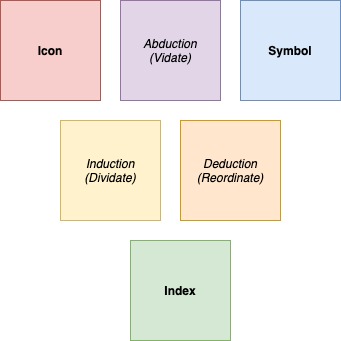It was C.S. Peirce, a century ago, that coined the use of this term to describe a thought process that would convey hypothesis making.
A little over 50 years ago, proponents of Artificial Intelligence, proposed that deduction would be the core feature of human intelligence. This idea was driven by the bias towards formal logical systems and the emergence of computers.
This approach was in stark contrast to cybernetics (introduced a decade early) that proposed that dynamical systems were a model for intelligence. The descendant of this approach was coined as artificial neural networks.
This dynamical systems approach was later understood as being similar to an induction based thought process. Deep Learning leads to what can be characterized as Artificial Intuition.
But despite the massive gains in DL capabilities in the last 8 years, Abduction, as described by Peirce, is clearly missing.
I've always found it instructive to employ Peirce's triadic thinking to understand complexities. It is usually the case the top middlebox (in purple) is difficult to grasp emergent phenomena.
It is expressed a downward causality where that emerges out of induction and deduction influences the dynamics of a system. Abduction comes from imagination. But imagination cannot happen without the vocabulary to imagine.
Refactoring is an activity practiced in software development that perhaps is a good analogy for abduction. Refactoring reorganizes concepts so as to better reflect the intentions of the programmer.
Refactoring is performed after an original design is implemented. This is because the programmer discovers new issues, that he previously wasn't aware of, with his current implementation.
As we build a model, we discover its flaws when we test it against reality. Refactoring is a systematic modification of the original model. An aspect of refactoring is that it does not involve wholesale changes, but one that introduces changes and keeps an original function.
Abduction is similar in that is not wild imagination, but rather imagination that is constrained by existing knowledge. Although there is some similarity with the perturbative learning methods of induction, there is a vast difference.
The perturbative learning methods tend to be first-order in that it is driven by a measure (which comes from a model of what's important). In contrast, Abduction is 2nd-order in that it is driven by a discrepancy in the formulation of a model.
This discrepancy is complex enough in structure that simple gradient descent is insufficient a solution. Rather, an informed modification is necessary to update the original model.
It requires a kind of empathy that understands the ramifications of actions that are to be performed to refactor an existing model.
It requires not only recognizing the flaws in our current knowledge but formulating the important questions so as to have a systematic way of discovering a new solution.
Intuition automatically allows us to see possibilities. Abductions however is that 2nd order skill that allows us to formulate good questions. It is only through questioning that we can discover possibilities that we've may never have imagined.
Peirce's Abduction is commonly understood as hypothesis selection. We often overlook though that a good hypothesis is one that makes obvious the generation of a good question.
Intuition relies on affordances that reveal possibilities. Abduction relies on hypotheses that reveal questions.

